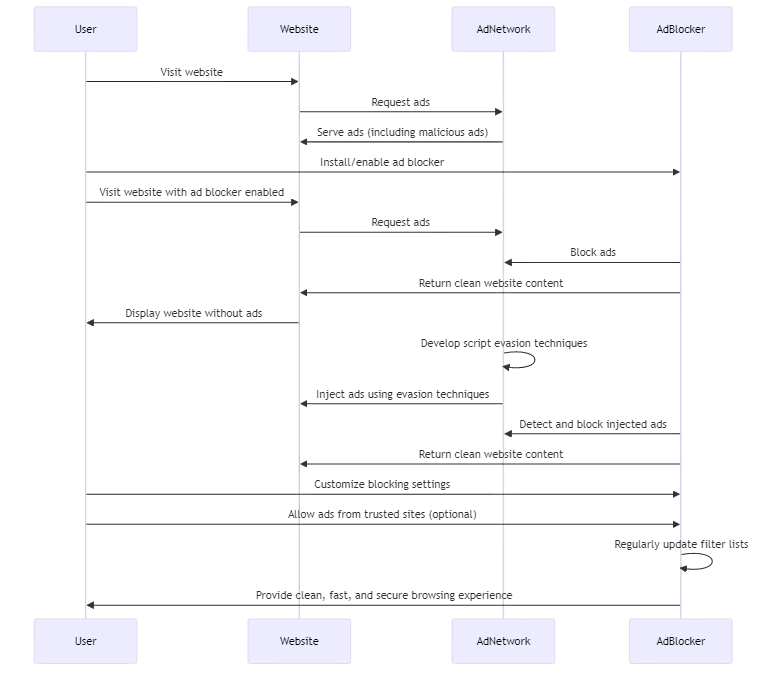
A Complete Guide to Ad Blockers and Their Benefits

Introduction
In today’s digital landscape, online advertisements have become ubiquitous. While some ads are harmless, others can be intrusive, misleading, or even malicious. This is the point where ad blocker becomes relevant. In this article, we will look at ad blockers, their advantages, possible risks, and how ad injection affects users.
What Is an Ad Blocker?
An ad blocker is a software tool designed to prevent advertisements from appearing on websites you visit.

These tools help remove ads, making your browsing experience cleaner, faster, and less distracting. Users can install ad blockers as browser extensions or integrate them into web browsers.
The Benefits of Using an Ad Blocker
Several compelling reasons exist to use an ad blocker:
- Improved User Experience: Ad blockers improve browsing by removing annoying ads, pop-ups, and auto-playing videos for a more enjoyable experience.
- Faster Page Loading: Ads often consume significant bandwidth and slow down page loading times. Ad blockers can drastically improve page load speed by blocking these resource-intensive elements.
- Enhanced Privacy: Some ads track user behavior and collect personal data. Ad blockers help protect your privacy by preventing these tracking mechanisms from functioning.
Identifying the Threat
While ad blockers offer numerous benefits, they also highlight a growing threat in the online advertising ecosystem: malicious ads. Malicious ads, known as “malvertising,” contain harmful code that can damage web browsers or infect users with malware unknowingly.
Malicious ads can take various forms, such as:
- Redirecting users to phishing websites
- Installing malware or ransomware on users’ devices
- Tricking users into downloading fake software updates
These threats underscore the importance of using reliable ad-blocking solutions to safeguard your online security.
Script Evasion Techniques
Ad networks and publishers constantly develop techniques to circumvent ad blockers and ensure they display their ads. One common way to avoid ad-blocking filters is by disguising or hiding ad scripts, a technique known as script evasion.
Here’s an example of a script evasion technique:
html
<div id="ad_container" style="display: none;">
<script>
var _0x1a2b=['getElementById','ad_container','style','display','block'];
(function(_0x2c4d0a,_0x1a2b33){var _0x4e7785=function(_0x5b5c7c){while(--_0x5b5c7c){_0x2c4d0a['push'](_0x2c4d0a['shift']());}};_0x4e7785(++_0x1a2b33);}(_0x1a2b,0x1c4));
var _0x4e77=function(_0x2c4d0a,_0x1a2b33){_0x2c4d0a=_0x2c4d0a-0x0;var _0x4e7785=_0x1a2b[_0x2c4d0a];return _0x4e7785;};
document[_0x4e77('0x0')](_0x4e77('0x1'))[_0x4e77('0x2')][_0x4e77('0x3')]=_0x4e77('0x4');
</script>
</div>In this example, we obfuscate the ad script using hexadecimal encoding and array manipulation techniques. This makes it harder for ad blockers to identify and block the script. However, advanced ad blockers employ sophisticated detection methods to combat these evasion techniques.
The Impact of Ad Injection
Ad injection occurs when someone adds ads to web pages without permission. Owners of websites and users might be unaware of these advertisements. Malicious browser extensions or adware programs often use this technique.
The consequences of ad injection can be severe:
- Revenue Loss for Publishers: Injected ads can replace legitimate ads, depriving publishers of their rightful ad revenue.
- Poor User Experience: Injected ads are often low-quality, irrelevant, or offensive, leading to a degraded user experience.
- Security Risks: Injected ads may contain malicious code or lead users to fraudulent websites, compromising their security and privacy.
To avoid ad injection, be careful with browser extensions and use trusted ad blockers that focus on user safety.
Choosing the Right Ad Blocker
Choose an ad-blocking solution that blocks ads effectively and protects your security and privacy. Many options are available to help with this. Here are some factors to consider:
- Regularly Updated Filters: Ad blockers rely on filter lists to identify and block ads. Ensure that the ad blocker you choose has regularly updated filters to stay ahead of evolving ad techniques.
- Customization Options: Find an ad blocker that allows you to select which ads to block. You can choose to allow ads from trusted sites or block certain types of ads.
- Privacy Features: Choose an ad blocker that prioritizes privacy by blocking trackers and preventing data collection.
- Performance Impact: Consider the ad blocker’s impact on browser performance. Some solutions may consume more resources than others.
Conclusion
Ad blockers have become increasingly popular among internet users as they provide a range of benefits. They have a main benefit of making the online experience cleaner. They eliminate annoying ads that clutter websites and disrupt the user’s browsing. By blocking these ads, users can enjoy a more streamlined and visually appealing online environment.
Overall, ad blockers are a valuable tool for users seeking a cleaner, faster, and safer online experience. Learn about ad blockers to protect yourself online and make smart choices while browsing the internet.
Remember, while ad blockers provide a valuable layer of protection, they are not a complete security solution. Stay safe online by using good browsing habits, updating software, and security tools to protect devices and data.
At DataSunrise, we understand the importance of data security and privacy. Our user-friendly and flexible tools for database security, data discovery (including OCR), and compliance can help organizations protect their sensitive information.
